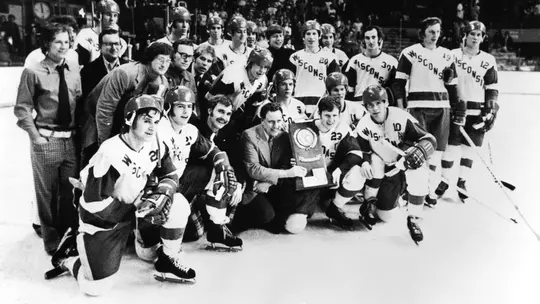
The "Perfect Team" -- UW's 1973 NCAA champions
1973 Badgers returning for 50th anniversary of UW's first hockey national title
2/7/2023
Perfection is one of the most elusive of human experiences, but Dean Talafous believes he lived such a moment back when he was a teenager playing for the Wisconsin men’s hockey team. It changed his life for the better and its impact endures to this day.
Talafous played hero for UW during the run-up to its first NCAA title back in March of 1973. His epic performance in the Frozen Four – a game-tying goal in the waning seconds that forced overtime in the semifinal and both game-winning conversions – earned him the Most Valuable Player award for the tournament.
The Badgers gamely found a way to erase two substantial deficits in the semis and oust Cornell 6-5 in OT, then neutralized a star-studded lineup to derail WCHA rival Denver 4-2 in the title game at Boston Garden.
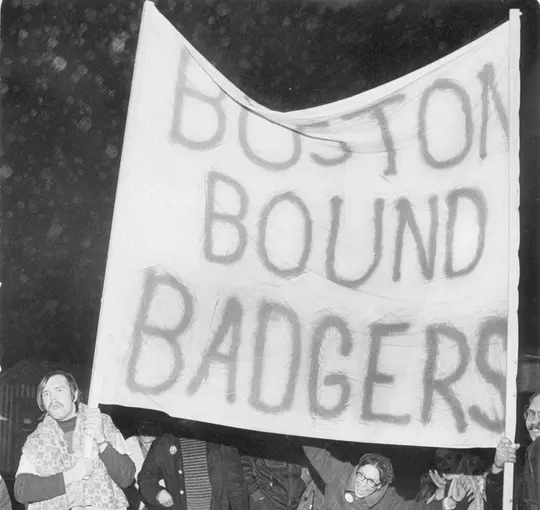
Fifty years have passed since Talafous was a 19-year-old sophomore center laying the foundation for one of the first extended pro careers by a Wisconsin player. He skated in 497 games with three NHL clubs from 1974 to ’82. He subsequently coached at the youth, high school, junior league, small college and major college levels.
In all that time – all those games, all those seasons, all those teammates and coaches – Talafous has never felt the vibes he did playing for the Badgers during their first of six trips to the top of the NCAA mountain.
“That’s the most perfect team I’ve ever been a part of as a coach and a player,’’ he said.
Perfect temperament. Perfect balance. Perfect blend.
“When you talk about a team where every individual had to contribute equally in order for us to pull that off, that’s really special,’’ Talafous said. “Every single guy contributed equally and it had to be that way for us to beat those two teams in the Final Four.
“Everybody was all about team. There was no selfishness. Everybody in their own way reached out and made the guy next to them better.’’
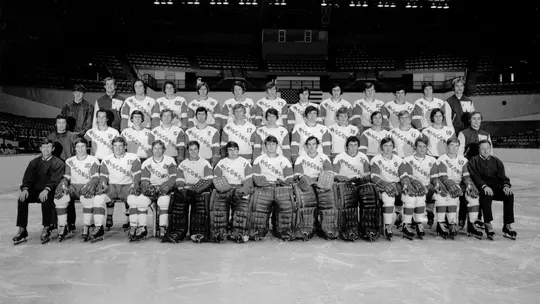
Talafous and other members of that distinguished squad will come together and celebrate the 50th anniversary of their achievement on Feb. 11 when Big Ten Conference archrival Minnesota comes to the Kohl Center.
That edition of the Badgers included three future U.S. Olympians (Steve Alley, Bob Lundeen, John Taft), a program-record five 20-goal scorers (Talafous, Norm Cherrey, Max Bentley, Dennis Olmstead and Gary Winchester), 13 Americans, 14 Canadians, and an iconic coach who’s enshrined in the International Hockey Hall of Fame (Bob Johnson).
It was a collection of great nicknames, too, from “Smokey’’ (Dave Arundel), the “Skating Fool’’ (Tim Dool) and “Sharpie’’ (Jim Makey) to “Rosey’’ (Billy Reay), “Shamus’’ (Bob Shaughnessy) and “Winnie’’ (Winchester).
There were eight seniors, seven freshmen and leaders in every corner of the dressing room at the Dane County Coliseum, where fans paid $27 for one-night season tickets to watch a dynasty come to life.
Ten players from that first national championship team at UW are in the 100-point club: Alley, Winchester, Cherrey, Talafous, Taft, Bentley, Olmstead, Dool, Jim Johnston and Bob Lundeen.
“An amazing team,’’ Dool said.
“It wasn’t necessarily the most talented team,’’ Alley said. “But it was always team first and individuals second.’’
Alley was a freshman in 1972-73. He said what stood out about the group was the senior leadership – Cherrey, Dool, Bentley, Johnston, Ernie Blackburn, Doug Kelso, Tom Kuklinski and Chris Wright – and the way they carried themselves.
“High quality individuals both on and off the ice,’’ Alley said.
“The seniors were quite a group of leaders,’’ Taft said, noting that Cherrey typically hosted team members after Saturday games and Dool, the UW captain, was a fan favorite because of his seemingly boundless energy and relentless hustle.
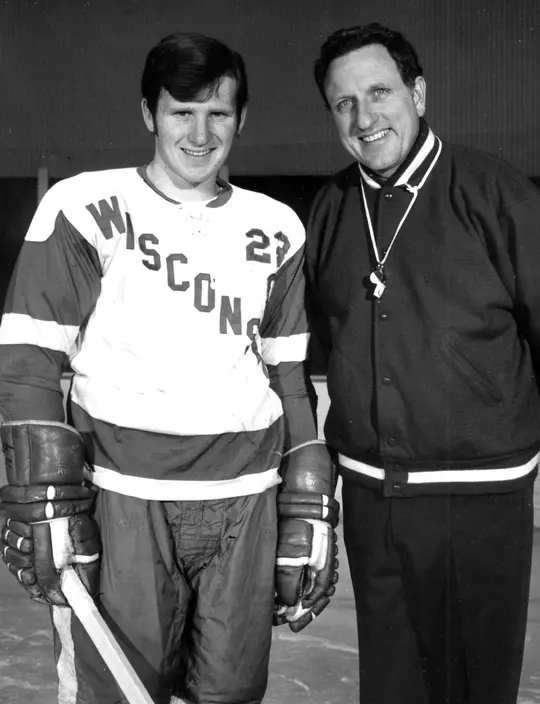
The Badgers finished third in the Western Collegiate Hockey Association in 1972-73, but managed to oust Minnesota and Notre Dame – teams they’d split with during the regular season – in the league playoffs to earn a berth in the four-school NCAA tournament.
Talafous said the collective effort in Boston overshadowed his personal three-act drama. He came off the bench as the extra attacker when Johnson pulled goaltender Dick Perkins in the final 45 seconds against Cornell. Talafous scored from the low slot with 5 seconds left in regulation to completely erase what had been a 5-2 third-period deficit, then converted a rebound with 33 seconds left in the first overtime to win it.
In the title game, Talafous broke a 2-2 tie midway through the second period with a backhander from the low slot that held up as the winner.
“I just happened to be in the goal crease three times,’’ he said.
Curiously, Talafous saw his first action as a defenseman in the Frozen Four. Jeff Rotsch, an All-America blue-liner for UW in 1971-72 who was serving as an assistant coach, remembers Johnson telling Rotsch that he would be the one to break the news to Talafous.
“He wasn’t happy at all,’’ Rotsch said.
“I’d never played defense,’’ Talafous said. “When he told me that, I was not happy.’’
Talafous was paired with Taft, who was known as a stay-at-home defender.
“For some reason, Tally didn’t have a solid spot as a wing or at center even though he was so talented,’’ Taft recalled.
Though unhappy with his place in the lineup and on the ice, Talafous was a force.
“I think I might have been up ice a little bit more than I should have,’’ he said.

It appeared the UW seniors carried a uniquely heavy burden. They qualified for Frozen Fours in 1969-70 and ’71-72, but fell short in the semis both seasons.
Rotsch recalled an exchange with Johnson where the coach was asked if his club needed a pep talk before facing Denver. The Pioneers had two first-team All-Americans and four first-team all-WCHA performers. Wisconsin had none.
“If they need a pep talk,’’ Johnson said, “I’ve got the wrong guys in the locker room.’’
Dool didn’t recall feeling pressure. He said the Badgers were deep, confident, balanced and driven.
“You just had to pinch yourself every once in a while,’’ he said.
Johnson would guide the Badgers to three NCAA titles – 1977 and ’81 were the others – before NHL stints in Calgary and Pittsburgh. He won a Stanley Cup with the Penguins in 1991, the same year he died of brain cancer.
What enduring messages did Johnson leave for his first national championship squad?
“None of us will ever be Bob Johnson, but we have greater passion because of his example and what he put into our lives,’’ Talafous said. “I’ve never had as much fun as he had, but I know that myself and our teams have had more fun than they would have had I not had his influence. Just that enthusiasm, that love for the game, that passion, that appreciation for the game.
“I believe that all of us who played for Bob, no matter what we did after (college), what Bob gave us is what we gave to others.’’
“Bob [Johnson] always told us, winning a championship means a lot today, but it’ll mean more to you later in life. I think that’s true. When you win, it never leaves you.’’
Dool said Johnson focused on the simple things.
“Very positive, the desire win, very prepared, very innovative,’’ Dool said.
Talafous noted that Johnson was always the first person on the ice for practice. He’d greet every player with a stick tap on the shin pads and a “Hey, big guy, you ready for another great practice?’’
Taft said Johnson emphasized one trait in particular.
“He always said that you had to be mentally tough,’’ Taft said. “To succeed you have to be mentally tough.’’
Alley loved Johnson’s positivity and consistency.
“He was always glass-half-full,’’ Alley said. “He never came into the locker room and yelled and screamed at us.
“In that sense, I guess you could say that it’s had an impact on my life because when you have that kind of attitude drummed into you, day in and day out for four years, it tends to rub off.’’
Alley recalled a time when he was a freshman when he was invited to dinner at Johnson’s home. Johnson said something profound.
“We all have challenges in life, but you have a choice every morning,’’ Johnson told Alley. “You can get out on the positive side of the bed or the negative side of the bed. Your choice.’’
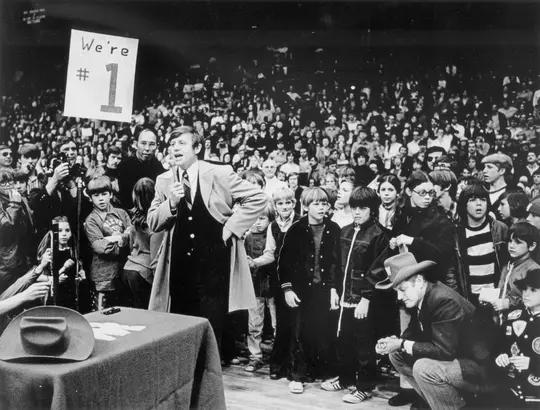
According to Alley, 90 percent of the 1972-73 team will be on hand for the 50th anniversary reunion.
“Bob always told us, winning a championship means a lot today, but it’ll mean more to you later in life. I think that’s true. When you win, it never leaves you.’’
Dool put it best.
“It was a heck of a ride,’’ he said, “and we enjoyed every minute of it.’’
